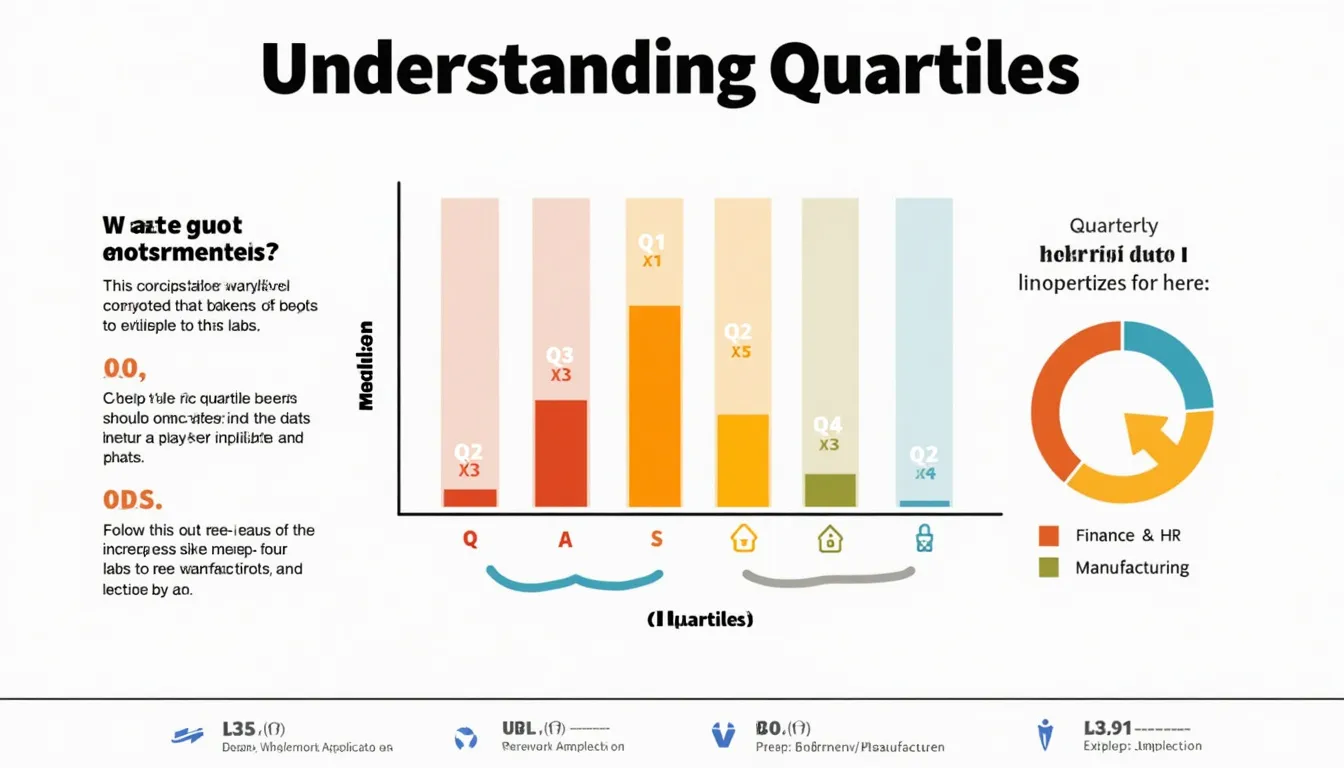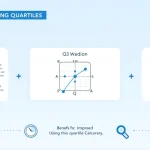Quartile Calculator
Is this tool helpful?
How to use the tool
- Paste your numbers
• Example A: 3, 8, 12, 20, 25, 30
• Example B: 45 50 55 60 80 90 100 110 130 - Pick a method
• Inclusive keeps the median inside Q1/Q3.
• Exclusive drops the median.
• Percentile rounds to the nearest percentile index. - (Optional) Tick “Include Visualization” to see a box-plot.
- Press “Calculate” to display Q1, Q2, Q3 and IQR. Out-of-range points appear as outliers on the plot.
Formulas used
For a sorted set of n values:
$$Q1\;position = rac{n+1}{4},\quad Q2\;position = rac{n+1}{2},\quad Q3\;position = rac{3(n+1)}{4}$$
If a position is non-integer, the calculator interpolates linearly (NIST/SEMATECH, 2023).
Worked examples
- Inclusive on 3 8 12 20 25 30
Q1 = 6.75, Q2 = 16, Q3 = 26.25 ⇒ IQR = 19.5. - Percentile on 45 50 55 60 80 90 100 110 130
Q1 = 55, Q2 = 80, Q3 = 100 ⇒ IQR = 45.
Quick-Facts
- The 1.5 × IQR outlier rule comes from box-plot inventor John Tukey (Tukey, 1977).
- ISO 3534-1:2006 standardises quartile terminology (ISO, 2006).
- “Box plots summarise a distribution in five numbers” (McGill, Tukey & Larsen, 1978).
- NIST recommends ≥20 observations for stable quartile estimates (NIST, 2023).
FAQ
What is the difference between inclusive and exclusive quartiles?
Inclusive quartiles treat the median as part of both halves, so Q1 and Q3 can sit closer to the centre; exclusive quartiles drop the median, widening Q1-Q3 spacing (Hyndman & Fan, 1996).
How does the calculator flag outliers?
It marks any value below Q1 − 1.5 × IQR or above Q3 + 1.5 × IQR, the rule popularised by Tukey’s box-plot paper (Tukey, 1977).
Can I trust quartiles with fewer than five points?
You can compute them, but NIST warns that quartile estimates stabilise only after ~20 observations (NIST/SEMATECH, 2023).
Does the tool assume normal distribution?
No. Quartiles are non-parametric; they work for skewed or bimodal data because they depend solely on order statistics (Wilcox, 2012).
How are ties handled?
If duplicate numbers appear, they occupy consecutive positions in the sorted list; interpolation still proceeds normally, so quartiles stay valid (Wikipedia “Quartile”).
Why does the percentile method round indices?
The script matches Excel’s PERCENTILE.EXC behaviour, selecting the nearest ranked value instead of interpolating (Microsoft Docs, 2023).
Is IQR related to standard deviation?
For normal data, IQR ≈ 1.349 × σ, giving a quick σ estimate when outliers skew SD (Montgomery, 2017).
What is a “five-number summary”?
Minimum, Q1, median, Q3, and maximum—“a simple description of spread and centre” (Tukey, 1977).
Important Disclaimer
The calculations, results, and content provided by our tools are not guaranteed to be accurate, complete, or reliable. Users are responsible for verifying and interpreting the results. Our content and tools may contain errors, biases, or inconsistencies. Do not enter personal data, sensitive information, or personally identifiable information in our web forms or tools. Such data entry violates our terms of service and may result in unauthorized disclosure to third parties. We reserve the right to save inputs and outputs from our tools for the purposes of error debugging, bias identification, and performance improvement. External companies providing AI models used in our tools may also save and process data in accordance with their own policies. By using our tools, you consent to this data collection and processing. We reserve the right to limit the usage of our tools based on current usability factors.







